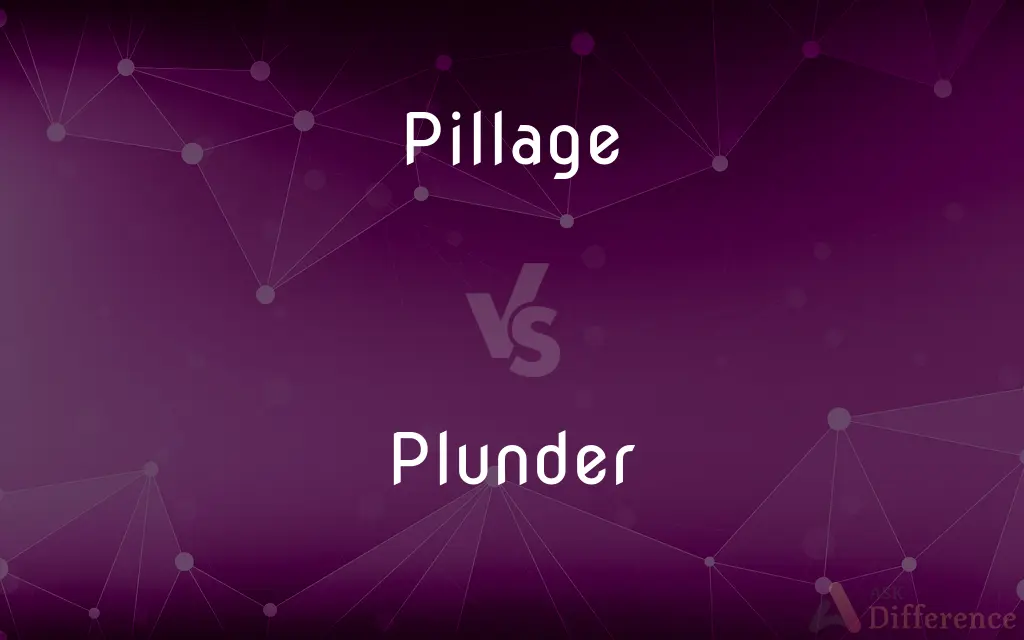Pillage vs. Plunder — What's the Difference?
By Urooj Arif & Fiza Rafique — Updated on March 10, 2024
Pillage refers to the act of looting or robbing goods by force during wartime, while plunder encompasses a broader scope of theft or robbery, often implying the use of violence or coercion in various contexts.

Difference Between Pillage and Plunder
Table of Contents
ADVERTISEMENT
Key Differences
Pillage specifically denotes the act of looting, often in a context of warfare or armed conflict, where soldiers or combatants loot property from a defeated enemy as a form of war spoils. On the other hand, plunder can occur in both wartime and peacetime scenarios and is not limited to any specific context.
While pillage is primarily focused on the act of looting during conflict, plunder carries a connotation of unlawfulness and immorality, emphasizing the illicit nature of the act regardless of the circumstances. Plunder is often used to describe acts that involve not just the theft of goods, but also the appropriation of land and resources, reflecting a broader spectrum of aggressive acquisition.
Historically, both pillage and plunder have been practiced by conquerors, pirates, and soldiers, often leaving a trail of destruction and loss. However, international laws, such as those established by the Geneva Conventions, have sought to curb the practice of pillaging, especially in modern warfare, by imposing strict rules against the looting and destruction of civilian properties.
The motivations behind pillage and plunder can also differ; pillage is often driven by the immediate opportunities of war, whereas plunder may be motivated by greed, economic gain, or the desire to exert control over a territory and its resources. In both cases, the acts negatively impact the victims, leading to loss of property, cultural heritage, and stability.
Despite their differences, pillage and plunder share common elements of forceful theft and the exploitation of power imbalances. They are both condemned by modern legal and ethical standards, which seek to protect individuals and communities from such acts of aggression and greed.
ADVERTISEMENT
Comparison Chart
Definition
The act of looting by force during warfare or conflict.
The act of stealing goods or property, often by force or coercion.
Context
Primarily occurs in the context of warfare or armed conflict.
Can occur in both wartime and peacetime, not limited to any specific context.
Legal/Ethical Connotations
Regulated by international laws of war, aiming to prevent civilian looting.
Broadly considered unlawful and immoral, associated with theft and coercion.
Scope
Focused on the looting of property.
Encompasses the theft of goods, appropriation of land, and resources.
Motivation
Often opportunistic, driven by the circumstances of war.
Motivated by greed, economic gain, or the desire to exert control.
Compare with Definitions
Pillage
Often conducted by military forces.
During the siege, soldiers were ordered not to engage in the pillage of civilian homes.
Plunder
The act of stealing by force or coercion.
Pirates were infamous for plundering ships on the high seas.
Pillage
The act of looting property by force during conflict.
The invading army was accused of pillaging the defeated city.
Plunder
Broadly condemned as unlawful.
International efforts aim to recover assets lost to plunder.
Pillage
Regulated by international law.
The soldier was court-martialed for violating laws against pillage.
Plunder
Involves both goods and resources.
The plunder included not only treasures but also the land itself.
Pillage
Associated with wartime looting practices.
Historical accounts often detail the pillage of villages during medieval wars.
Plunder
Not limited to wartime scenarios.
The corrupt regime plundered the country's resources for years.
Pillage
Targets typically include movable property.
The pillage resulted in the loss of invaluable cultural artifacts.
Plunder
Driven by various motivations.
Greed and the desire for power often motivate plunder.
Pillage
To rob of goods by force, especially in time of war; plunder.
Plunder
To rob of goods by force, especially in time of war; pillage
Plunder a village.
Pillage
To take as spoils.
Plunder
To seize wrongfully or by force; steal
Plundered the supplies.
Pillage
To take spoils by force.
Plunder
To take booty; rob.
Pillage
The act of pillaging.
Plunder
The act or practice of plundering.
Pillage
Something pillaged; spoils.
Plunder
Property stolen by fraud or force; booty.
Pillage
(ambitransitive) To loot or plunder by force, especially in time of war.
Plunder
(transitive) To pillage, take or destroy all the goods of, by force (as in war); to raid, sack.
The mercenaries plundered the small town.
The shopkeeper was plundered of his possessions by the burglar.
Pillage
The spoils of war.
Plunder
(transitive) To take (goods) by pillage.
The mercenaries plundered all the goods they found.
Pillage
The act of pillaging.
Plunder
(intransitive) To take by force or wrongfully; to commit robbery or looting, to raid.
“Now to plunder, mateys!” screamed a buccaneer, to cries of “Arrgh!” and “Aye!” all around.
Pillage
The act of pillaging; robbery.
Plunder
(transitive) To make extensive (over)use of, as if by plundering; to use or use up wrongfully.
The miners plundered the jungle for its diamonds till it became a muddy waste.
Pillage
That which is taken from another or others by open force, particularly and chiefly from enemies in war; plunder; spoil; booty.
Which pillage they with merry march bring home.
Plunder
(transitive) To take unexpectedly.
Pillage
To strip of money or goods by open violence; to plunder; to spoil; to lay waste; as, to pillage the camp of an enemy.
Mummius . . . took, pillaged, and burnt their city.
Plunder
An instance of plundering.
Pillage
To take spoil; to plunder; to ravage.
They were suffered to pillage wherever they went.
Plunder
The loot attained by plundering.
The Hessian kept his choicest plunder in a sack that never left his person, for fear that his comrades would steal it.
Pillage
Goods or money obtained illegally
Plunder
Baggage; luggage.
Pillage
The act of stealing valuable things from a place;
The plundering of the Parthenon
His plundering of the great authors
Plunder
To take the goods of by force, or without right; to pillage; to spoil; to sack; to strip; to rob; as, to plunder travelers.
Nebuchadnezzar plunders the temple of God.
Pillage
Steal goods; take as spoils;
During the earthquake people looted the stores that were deserted by their owners
Plunder
To take by pillage; to appropriate forcibly; as, the enemy plundered all the goods they found.
Plunder
The act of plundering or pillaging; robbery. See Syn. of Pillage.
Inroads and plunders of the Saracens.
Plunder
That which is taken by open force from an enemy; pillage; spoil; booty; also, that which is taken by theft or fraud.
Plunder
Personal property and effects; baggage or luggage.
Plunder
Goods or money obtained illegally
Plunder
Take illegally; of intellectual property;
This writer plundered from famous authors
Plunder
Plunder (a town) after capture;
The barbarians sacked Rome
Plunder
Steal goods; take as spoils;
During the earthquake people looted the stores that were deserted by their owners
Plunder
Destroy and strip of its possession;
The soldiers raped the beautiful country
Common Curiosities
How do modern societies view pillage and plunder?
Modern legal and ethical standards broadly condemn both pillage and plunder, emphasizing the protection of human rights and property.
What are common targets of plunder?
Common targets include valuable goods, natural resources, land, and even cultural heritage items.
Can individuals be held accountable for acts of pillage or plunder?
Yes, individuals can face legal consequences under both national and international law for engaging in pillage or plunder.
What impact does plunder have on societies?
Plunder can lead to significant economic, social, and cultural harm, undermining development and stability.
How have historical instances of pillage and plunder shaped international law?
Historical instances have prompted the development of stricter international laws and conventions aimed at preventing such acts and protecting civilian populations.
What legal protections exist against pillage?
International laws, such as the Geneva Conventions, explicitly prohibit pillage during armed conflicts, aiming to protect civilian properties.
How is pillage different from theft?
Pillage is a specific form of theft occurring under the conditions of warfare or conflict, often regulated by international laws, whereas theft is a broader term for the unlawful taking of someone else's property.
Can plunder occur in legal contexts?
While plunder inherently involves illegality due to its coercive or forceful nature, some historical contexts may have legally sanctioned forms of plunder through laws now considered unethical.
What measures can be taken to recover from pillage or plunder?
Recovery efforts may include legal action to repatriate stolen goods, international aid, and efforts to rebuild and restore communities.
How does the international community address modern instances of plunder?
Through legal actions, sanctions, and diplomatic efforts, the international community seeks to prevent plunder and hold perpetrators accountable.
Share Your Discovery

Previous Comparison
Caplet vs. Tablet
Next Comparison
Divisor vs. DividendAuthor Spotlight
Written by
Urooj ArifUrooj is a skilled content writer at Ask Difference, known for her exceptional ability to simplify complex topics into engaging and informative content. With a passion for research and a flair for clear, concise writing, she consistently delivers articles that resonate with our diverse audience.
Co-written by
Fiza RafiqueFiza Rafique is a skilled content writer at AskDifference.com, where she meticulously refines and enhances written pieces. Drawing from her vast editorial expertise, Fiza ensures clarity, accuracy, and precision in every article. Passionate about language, she continually seeks to elevate the quality of content for readers worldwide.














































